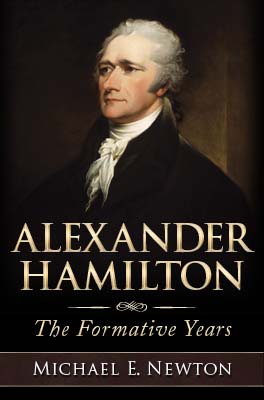The Extensive Influence of Alexander Hamilton’s
‘A Full Vindication’ and ‘The Farmer Refuted’
 As a 17-year-old, Alexander Hamilton wrote A Full Vindication of the Measures of Congress. A few months later, he penned The Farmer Refuted. While these essays have been widely praised, some have questioned their influence. One Hamilton biographer asserted, “Probably few people in turbulent New York at that time heard of Hamilton’s pamphlets. They were known and admired in a restricted circle, but that circle included men of leadership and influence, whose good opinion was valuable.” Another argued that the “significance” of these essays “has been overstated. . . . Had not Hamilton become famous, his essays . . . would merit only cursory attention.”
As a 17-year-old, Alexander Hamilton wrote A Full Vindication of the Measures of Congress. A few months later, he penned The Farmer Refuted. While these essays have been widely praised, some have questioned their influence. One Hamilton biographer asserted, “Probably few people in turbulent New York at that time heard of Hamilton’s pamphlets. They were known and admired in a restricted circle, but that circle included men of leadership and influence, whose good opinion was valuable.” Another argued that the “significance” of these essays “has been overstated. . . . Had not Hamilton become famous, his essays . . . would merit only cursory attention.”
While it is true that more attention has been given to these essays due to Hamilton’s later fame, they certainly attracted more than just “cursory attention” when they were published. In New York City, James Rivington advertised Hamilton’s essays in eleven issues of Rivington’s New-York Gazetteer over a three-month period. Rivington also offered to supply “gentlemen” living outside of New York City with a number of pamphlets he had published, including those written by Seabury and Hamilton. Rivington even encouraged his customers to “purchase by the dozen” in order to “distribute” copies “amongst their Friends” or “amongst those who cannot afford to purchase them.” Over in Philadelphia, John Airey advertised copies of A Full Vindication in a December 1774 issue of Dunlap’s Pennsylvania Packet. And in Boston, bookseller Henry Knox, the future major general and secretary of war, advertised copies of The Farmer Refuted in one March 1775 issue of The Boston-Gazette and two issues of The Boston Evening-Post.
Hamilton’s essays were not just advertised outside of New York, but were also purchased, read, and even quoted. In The Pennsylvania Gazette of January 25, 1775, “A Philadelphian” writing about “the iniquity of the Slave-trade” quoted “the Friend to America” who had asserted that “all men have one common original, they participate in one common nature, and consequently have one common right. No reason can be assigned why one man should exercise any power over his fellow creatures more than another, unless they voluntarily vested him with it.” Hamilton had written A Full Vindication under the name “A Friend to America” and the quote in the Philadelphia newspaper came straight out of Hamilton’s essay.
Clearly, Hamilton’s essays were circulated throughout the colonies and their influence was widespread.
(Knox’s advertising of The Farmer Refuted has previously been noted in a handful of books but never in a Hamilton bio. John Airey’s advertising Hamilton’s A Full Vindication and Hamilton’s essay being quoted in The Pennsylvania Gazette on January 25 are new discoveries.)
Supporting evidence and citations will be found in Alexander Hamilton: The Formative Years.
